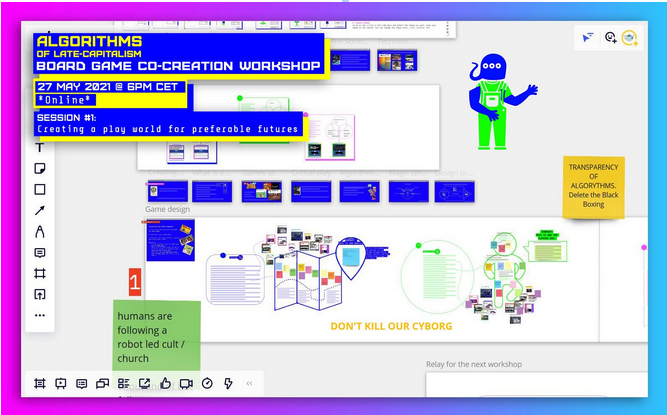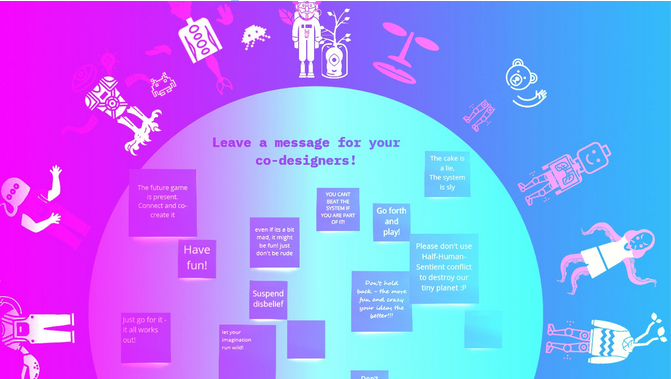Unsere vernetzte Welt verstehen

Auf dem Weg zum technologischen Pluriversum
Was würde passieren, wenn wir die Startups im Silicon Valley auflösen und sie in gemeinschaftsbasierte Tech-Kollektive umstrukturieren würden? Mithilfe unseres Brettspiel-Projekts Algorithms of Late-Capitalism erkunden wir Ideen zur Schaffung eines technologischen Pluriversums.
AI-driven technologies are becoming increasingly complex (e.g. things like neural networks being innately black-boxed). This is creating an ever-widening rift between the technicians who design and develop these technologies and the communities in which these technologies are eventually deployed and operationalized. Yet the abstract algorithms and data structures comprising such software have a material relation to – and impact on – the lives of those who knowingly or unknowingly come into contact with them.
As Rob Kitchin writes, “[algorithms] shape how we understand the world and they do work in and make the world through their execution as software, with profound consequences” (2017). If AI and other algorithmic technologies have a material impact on our lives, shouldn’t we as end-users and members of the public have more stake in how these technologies are designed, developed, and eventually deployed in the public sphere and in our communities?
A board game to imagine a more inclusive technological future
In our recent Algorithms of Late-Capitalism board game project we developed a game co-creation process that unfolds over a series of interlinked public workshops. The theme of the game centers on haywire algorithmic and AI technologies taken to an absurd futuristic extreme following a prevailing capitalist logic of technocratic control.

The true heart of the project, however, is the co-creation method through which the game is being developed. The rationale behind employing this method of communal and relational design is that we wanted to develop the game in a way that reflects our vision for how we can create a more inclusive, representative, and diversified digital future. In as much as the game development process is able to, we want it to reflect a shift towards a technological pluriverse.
A new anti-universalist design approach for digital technologies
We borrow the term ‘pluriverse’ from Arturo Escobar who writes on the topic of design. “In designing tools (objects, structures, policies, expert systems, discourses, even narratives),” says Escobar, “we are creating ways of being” (Escobar, 2018). When you take this into account we can start to redefine design questions, problems, and practices in ways that are more appropriate for different cultures, communities, and lived experiences.
Escobar highlights the need to move away from the functionalist universalist design practices born out of capitalist modernity, towards practices that allow multiple possible worlds, communities, and perspectives to be included in design practices.
We believe that the same ideas should be applied to the design of digital technologies such as AI. The design of these technologies should be a bottom-up process – instead of a top-down process in which start-up founders and technicians impose universalist visions of technology onto the lives of diverse publics around the world.

Can tech companies restructure themselves into tech collectives?
What would happen if such pluriverse design practices were adopted by tech companies? Would we even have tech companies as we now think of them (following the Silicon Valley ideology ‘move fast and break things’)? Would they invariably restructure into tech collectives? Or could we imagine start-ups adopting Research & Development (R&D) methods similar to Participatory Action Research in which ‘research subjects’ become involved as active and empowered co-researchers?
The inclusion of non-experts or non-technicians in the design, development, and deployment of AI and other digital technologies can be extremely impactful and positive. But in order for this vision of a technological pluriverse to work, we first have to truly realize that these technologies are not merely technical. They are as much cultural, social, and material as any other designed object inhabiting our modern lives.
References:
Kitchin, R. (2017). “Thinking critically about and researching algorithms”, in Information, Communication & Society, 20(1). Available: http://www.futuredata.io.s3-website-us-west-2.amazonaws.com/classes/cs345s/handouts/kitchin.pdf
Escobar, A. (2018). Designs for the Pluriverse: Radical Interdependence, Autonomy, and the Making of Worlds. Duke University Press: London.
About the authors:
Adriaan Odendaal is a multimedia designer and web-developer whose work revolves around algorithmic literacy, critical and speculative design, digital culture as well as game/software studies. He has a master’s degree in Media Arts Cultures and currently works as a content writer, designer, and web developer for Volume podcasting network.
Karla Zavala Barreda is a researcher, designer and digital project manager, who works at the intersection of software, design, and education. She has a master’s degree in Media Arts Cultures and currently is a PhD candidate in Media Studies at the University of Amsterdam, where she does research on apps ecology and learning software aimed at young children.
Together, they have co-founded the research and design studio internet teapot, a collaboration that focuses on speculative and critical design projects and research, stemming from shared interests in digital culture, critical theory, and the belief that design can be used in a socially transformative way. Karla and Adriaan took part in the Edit-a-thon on Intersectional approaches to AI hosted by HIIG’s AI & Society Lab.
Dieser Beitrag spiegelt die Meinung der Autorinnen und Autoren und weder notwendigerweise noch ausschließlich die Meinung des Institutes wider. Für mehr Informationen zu den Inhalten dieser Beiträge und den assoziierten Forschungsprojekten kontaktieren Sie bitte info@hiig.de

Jetzt anmelden und die neuesten Blogartikel einmal im Monat per Newsletter erhalten.
Künstliche Intelligenz und Gesellschaft
Freundlich, aber distanziert: Die unbeabsichtigten Folgen KI-generierter E-Mails
KI-generierte E-Mails sparen Mitarbeitenden Zeit und erleichtern den Arbeitsalltag. Aber verlieren wir dadurch unsere Kommunikationsfähigkeiten?
KI am Mikrofon: Die Stimme der Zukunft?
Von synthetischen Stimmen bis hin zu automatisch erstellten Podcast-Folgen – KI am Mikrofon revolutioniert die Produktion digitaler Audioinhalte.
Haben Community Notes eine Parteipräferenz?
Dieser Artikel analysiert, ob Community Notes Desinformation eindämmen oder ob ihre Verteilung und Bewertung politische Tendenzen widerspiegeln.




